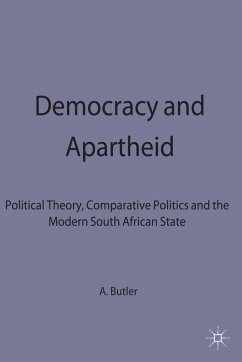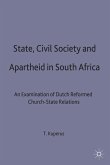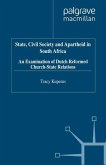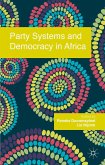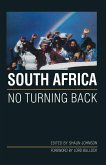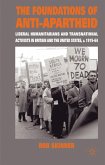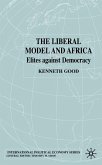South Africa's 1994 election was widely hailed around the world as miraculous. In this book, Anthony Butler examines South African experiences to cast doubt on this celebratory attitude to democracy. Contemporary political analysis highlights the benefits that democracy can sometimes bring. Butler, by contrast, argues that democracy can be malign. He attacks the myth that democracy ended apartheid, and shows that democratic practices themselves contributed to its evils. The author also explores weaknesses in political science as a discipline. This book will be essential reading for specialists in South Africa, and will appeal to political theorists, students of comparative politics, and historians.
Hinweis: Dieser Artikel kann nur an eine deutsche Lieferadresse ausgeliefert werden.
Hinweis: Dieser Artikel kann nur an eine deutsche Lieferadresse ausgeliefert werden.
'This is a powerful exposition of the ways in which conventional categories of political analysis, liberal and local, have both influenced events in South Africa in the 1990s and misunderstood them. Theorists have perpetuated continuities that have in fact been broken and argued for discontinuities that are less striking than they seem. It will be essential reading for students of South Africa itself and those who suppose that the extension of 'democracy' in the 1990s is an unequivocal advance.' - Geoffrey Hawthorn, University of Cambridge
'Dr Butler's book is a closely argued study of the nature of political enquiry, focusing on the modes of analysis employed by western scholars and their South African counterparts in their exploration of South Africa's past and present. It will provoke keen debate and provide a source of valuable insight into the nature of liberal democracy and the incentives and constraints that attend the construction of social and political theory.' - Professor J. E. Spence, Associate Fellow, Royal Institute of International Affairs
'...an important work on South African scholarship of wide interest to scholars and policy makers...required reading for the South African specialist. The fact that it organizes a vast literature on South Africa is also likely to prove very useful in graduate teaching.' - Henrik Sommer, Nationalism & Ethnic Politics
'Dr Butler's book is a closely argued study of the nature of political enquiry, focusing on the modes of analysis employed by western scholars and their South African counterparts in their exploration of South Africa's past and present. It will provoke keen debate and provide a source of valuable insight into the nature of liberal democracy and the incentives and constraints that attend the construction of social and political theory.' - Professor J. E. Spence, Associate Fellow, Royal Institute of International Affairs
'...an important work on South African scholarship of wide interest to scholars and policy makers...required reading for the South African specialist. The fact that it organizes a vast literature on South Africa is also likely to prove very useful in graduate teaching.' - Henrik Sommer, Nationalism & Ethnic Politics

